Mollie vs. Stripe vs. Adyen: Comparing the top PSPs in 2025
The world of online payments has seen enormous evolution, and in 2025, the landscape is more competitive, and even more confusing than ever before. If you're an eCommerce business owner, startup founder, or digital platform operator, you're probably asking one big question: Which payment service provider (PSP) is right for my business? Three major players often come up in this conversation: Stripe, Adyen, and Mollie. While Stripe and Adyen have been at the forefront of online payments for years, Mollie has quickly gained traction across Europe, making waves as a simple, transparent, and affordable option for small to mid-sized businesses.
In this comprehensive PSP comparison guide, we’ll look at Stripe, Adyen, and Mollie in detail, exploring their key features, pricing, strengths, and real-world use cases. Whether you're launching your first online store or scaling a multi-national business, this guide will help you choose the right provider for 2025 and beyond.
Stripe
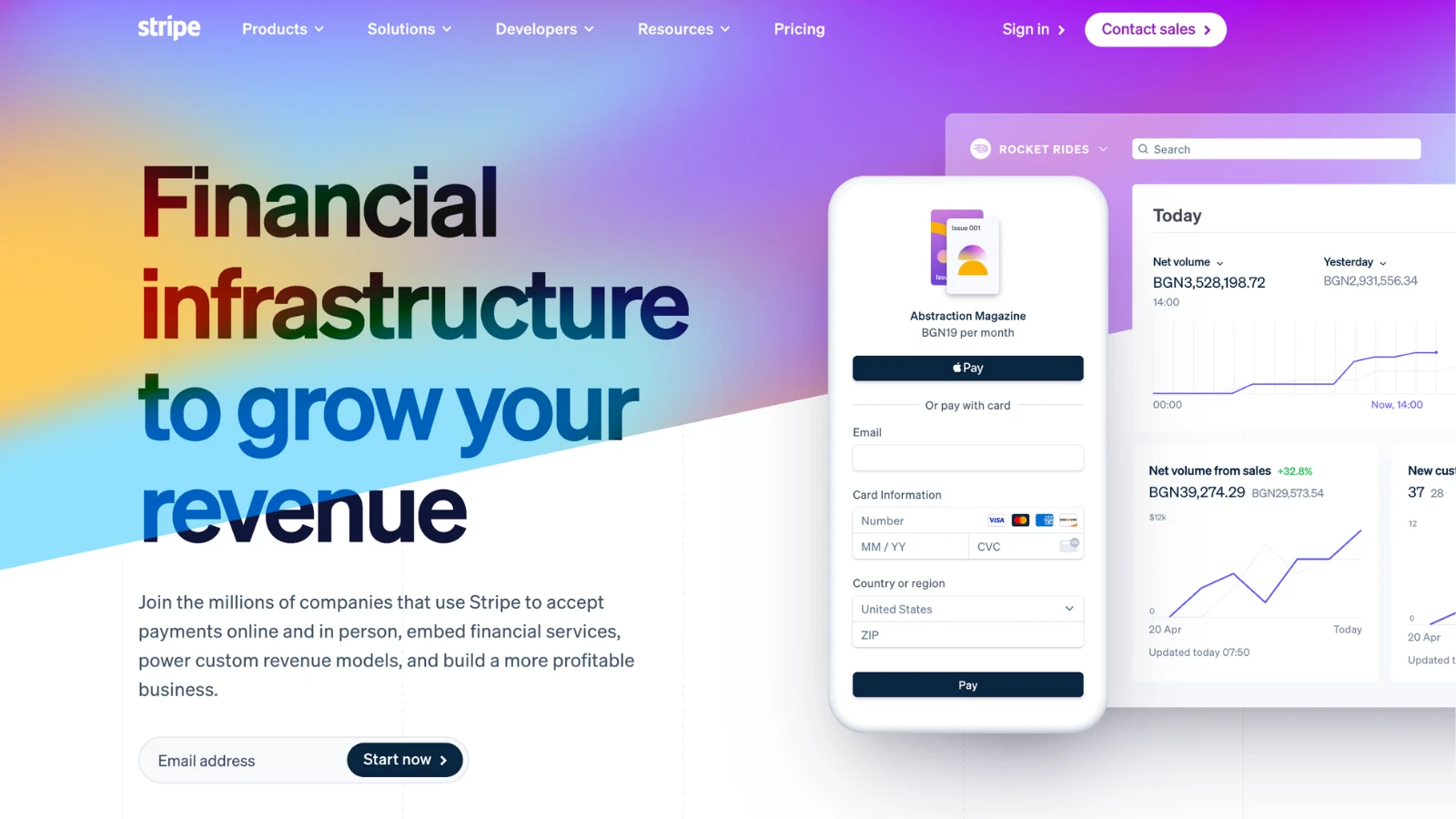
Stripe has become a household name in the fintech world. Founded in 2010, it's the go-to PSP for many startups, SaaS companies, marketplaces, and eCommerce brands. Stripe has built its reputation around developer-friendly tools, sleek design, and a powerful global payments infrastructure.
Key features
- Over 135 currencies and 100+ local and global payment methods, including Apple Pay, Google Pay, Klarna, Alipay, and ACH
- Developer-first platform with extensive API documentation
- Stripe Billing for subscription management and invoicing
- Stripe Terminal for in-person payments with compatible POS hardware
- Stripe Connect for platforms and marketplaces with multi-party payments
- Machine-learning powered fraud protection via Stripe Radar
- Built-in tax automation with Stripe Tax
- Detailed reporting and analytics tools through Stripe Sigma
Strengths
- All-in-one platform: Stripe supports online and in-person payments, subscriptions, invoicing, fraud prevention, tax tools, and more—all under one roof. Key features include Stripe Billing for subscriptions, Stripe Terminal for POS payments, Stripe Radar for fraud prevention, and Stripe Tax for automated tax compliance.
- Excellent APIs: Stripe is famous for its clean, well-documented APIs. If you have developers on your team, they’ll likely love working with Stripe.
- Global reach: Stripe supports over 135 currencies and payment methods including Apple Pay, Google Pay, Klarna, and more.
- Flexible pricing: Transparent, flat-rate pricing makes it easy for startups and SMBs to plan costs.
- Strong support for platforms and marketplaces: Stripe Connect makes it easy to split payments between sellers and track balances.
Drawbacks
- May require developer involvement for full customization.
- Stripe’s rules around fraud and chargebacks can feel strict for some merchants.
- In-person payment hardware is still more limited than some competitors.
Pricing (2025)
Stripe uses a flat-rate pricing model which is simple to understand:
- 2.9% + $0.30 per successful domestic card transaction
- 3.9–4.4% for international cards
- $15 per chargeback
- No setup or monthly fees
- Custom pricing available for enterprise clients
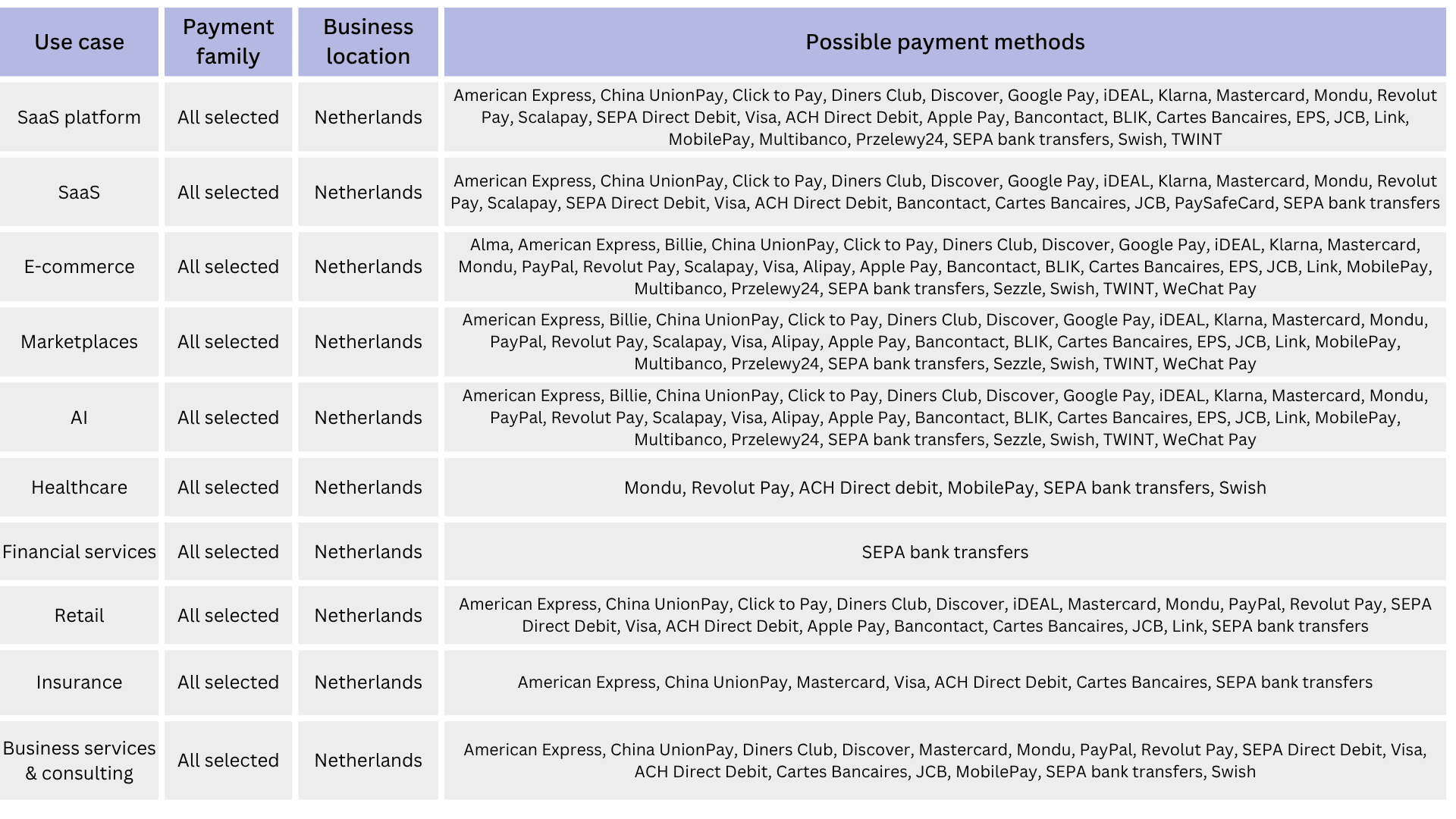
Who should use Stripe?
Stripe is ideal for tech-savvy companies that need flexibility and scalability. Whether you're selling digital products, running a subscription business, or operating a global marketplace, Stripe offers everything you need to grow and adapt. Its extensive integrations with platforms like Shopify, WooCommerce, and BigCommerce make it even easier to adopt.
Adyen

Adyen is a payment platform based in Amsterdam, used by many large brands such as Uber, Spotify, and Microsoft. Adyen offers a unified commerce experience, handling payments across in-store, online, and mobile channels.
Key features
- Direct connection to Visa, Mastercard, and local card networks for improved approval rates
- Support for over 150 currencies and dozens of local payment methods
- One backend system for all payment channels (in-store, mobile, online)
- POS hardware for retail and hospitality businesses
- Real-time data and performance insights
- Risk management tools with AI-powered fraud detection
- Recurring payments support with tokenization and secure storage
- Customizable checkout SDKs and API tools for web and mobile
Strengths
- Unified commerce: Online, in-store, mobile—all managed in one system. Adyen provides a single platform for global transactions across every channel.
- Custom routing: Adyen connects directly to card networks, optimizing approval rates and reducing fees through its RevenueAccelerate system.
- International power: Adyen is designed for cross-border payments and can settle in dozens of currencies, supporting over 150 payment methods like WeChat Pay, Alipay, and SEPA.
- Real-time reporting: Their dashboard gives deep insight into payment performance.
- Risk management: Built-in tools help reduce fraud and simplify compliance with RevenueProtect.
Drawbacks
- Complex setup process, especially for smaller merchants.
- Not as plug-and-play as Stripe or Mollie.
- Pricing structure is harder to predict due to interchange++.
- Customer support is sometimes slower for smaller clients.
Pricing (2025)
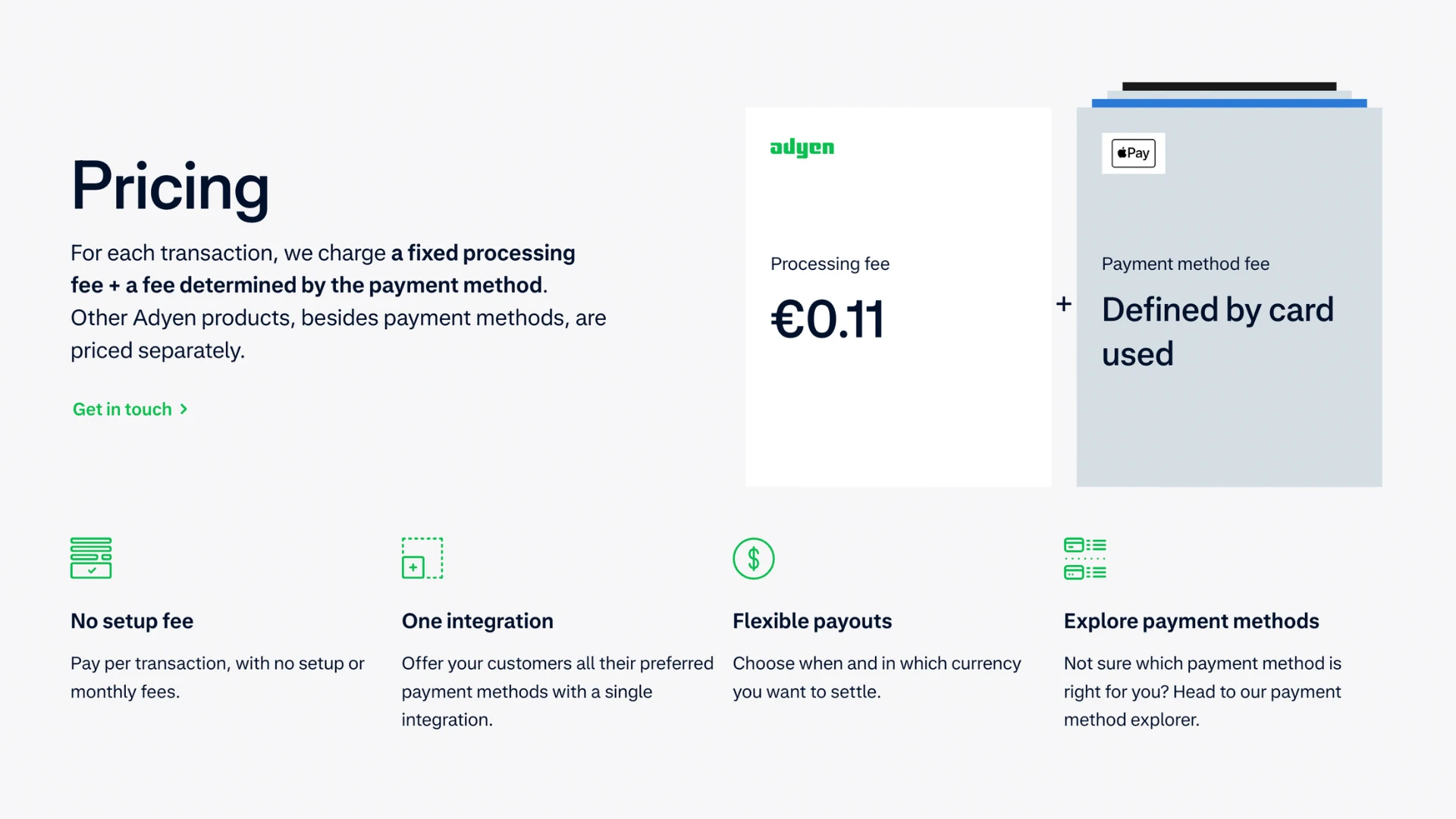
Adyen uses an interchange++ pricing model, which is more complex but can offer better rates for high-volume businesses:
- ~0.60% + €0.13 for Visa/Mastercard (EU cards)
- 3.3% + €0.23 for American Express
- SEPA direct debit: ~€0.25
- ACH: ~€0.40 per transaction
- Chargeback fees: €5–€100 depending on dispute type
- No monthly fees, but there is often a minimum monthly invoice
If you want to learn more about the payment methods per country, click here.
Who should use Adyen?
Adyen is best for large enterprises or high-volume businesses operating in multiple countries. If you're managing a global omnichannel business with brick-and-mortar and online stores, Adyen's all-in-one platform and smart routing capabilities offer a robust solution. It's also a top choice for travel, hospitality, and high-risk verticals. Adyen integrates well with enterprise systems like Salesforce Commerce Cloud and offers custom-built solutions for verticals with complex billing needs.
Mollie
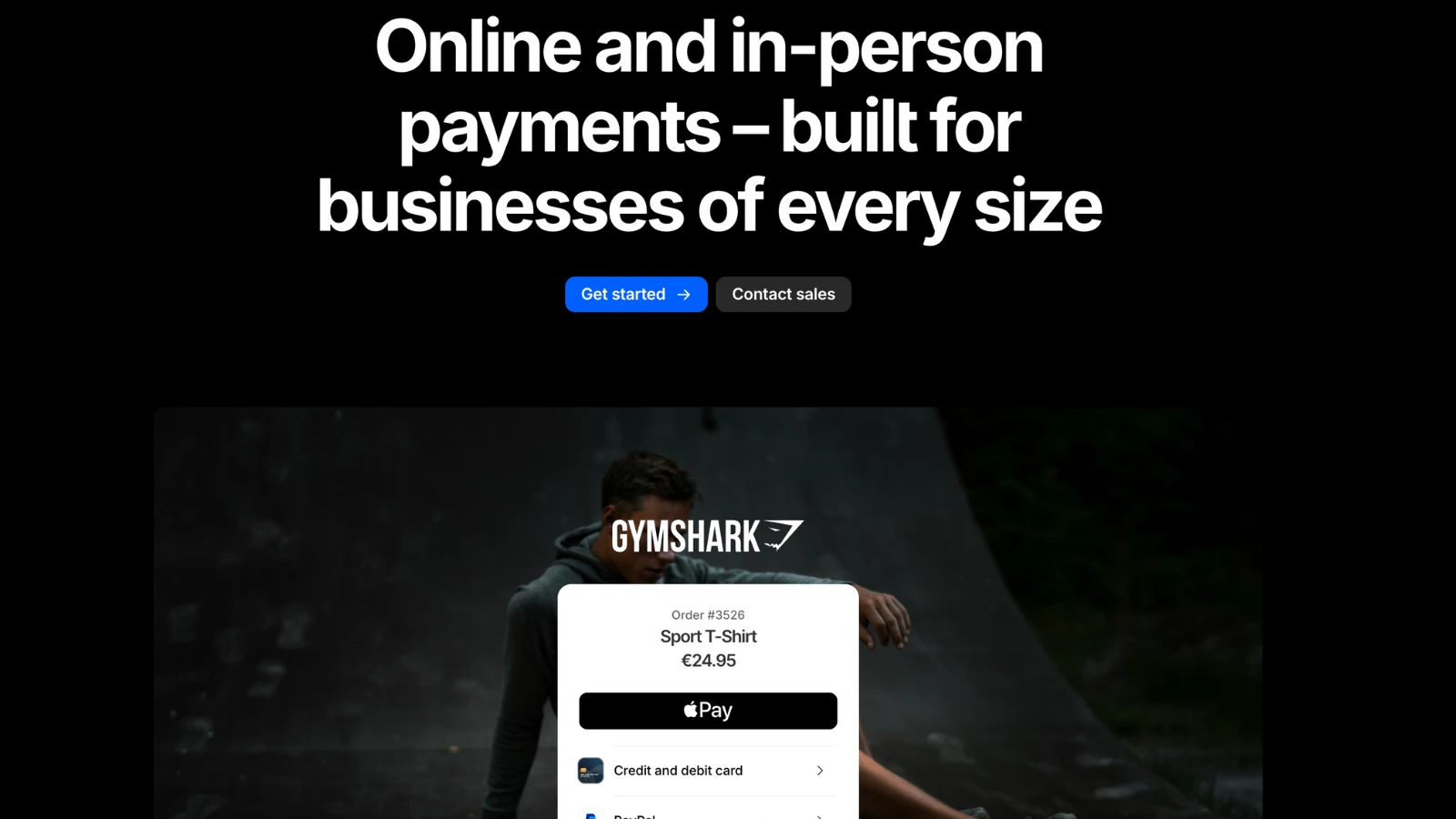
Mollie is a PSP that’s quickly becoming a favorite across Europe. Based in the Netherlands, Mollie is known for simplicity, transparent pricing, and ease of use. If you’re a small business or running a regional eCommerce store, Mollie might be exactly what you need.
Key features
- Supports all major European payment methods like iDEAL, Bancontact, SOFORT, Giropay, SEPA, and more
- Quick onboarding with no monthly fees or contracts
- Seamless integration with Shopify, Magento, WooCommerce
- Simple, transparent pricing breakdown
- Real-time transaction tracking and easy-to-read dashboards
- Support for recurring billing, subscriptions, and donations
- PCI-DSS Level 1 compliance and strong fraud monitoring
Strengths
- Easy onboarding: Set up an account and start accepting payments in minutes—no developers required. Integration takes minutes using platforms like Shopify, Magento, and WooCommerce.
- European focus: Mollie supports all major EU payment methods including iDEAL, Bancontact, SOFORT, SEPA, and more.
- Transparent pricing: No monthly fees, no hidden costs, and clear transaction-based pricing.
- Local payment methods: Great for regional preferences, especially in the Netherlands, Belgium, Germany, and France.
- Strong integrations: Works out-of-the-box with major platforms and CRMs like Lightspeed, PrestaShop, and more.
Drawbacks
- Limited coverage outside Europe
- Lacks some of the enterprise features of Stripe and Adyen
- Not ideal for global, high-volume businesses
Pricing (2025)
Mollie’s pricing is straightforward, with no minimum invoice or lock-ins:
- 1.2% + €0.25 for EU cards
- 2.8% + €0.25 for non-EU cards
- iDEAL: €0.29
- Bancontact: €0.39
- PayPal: 3.4% + €0.35
- No setup, subscription, or hidden fees
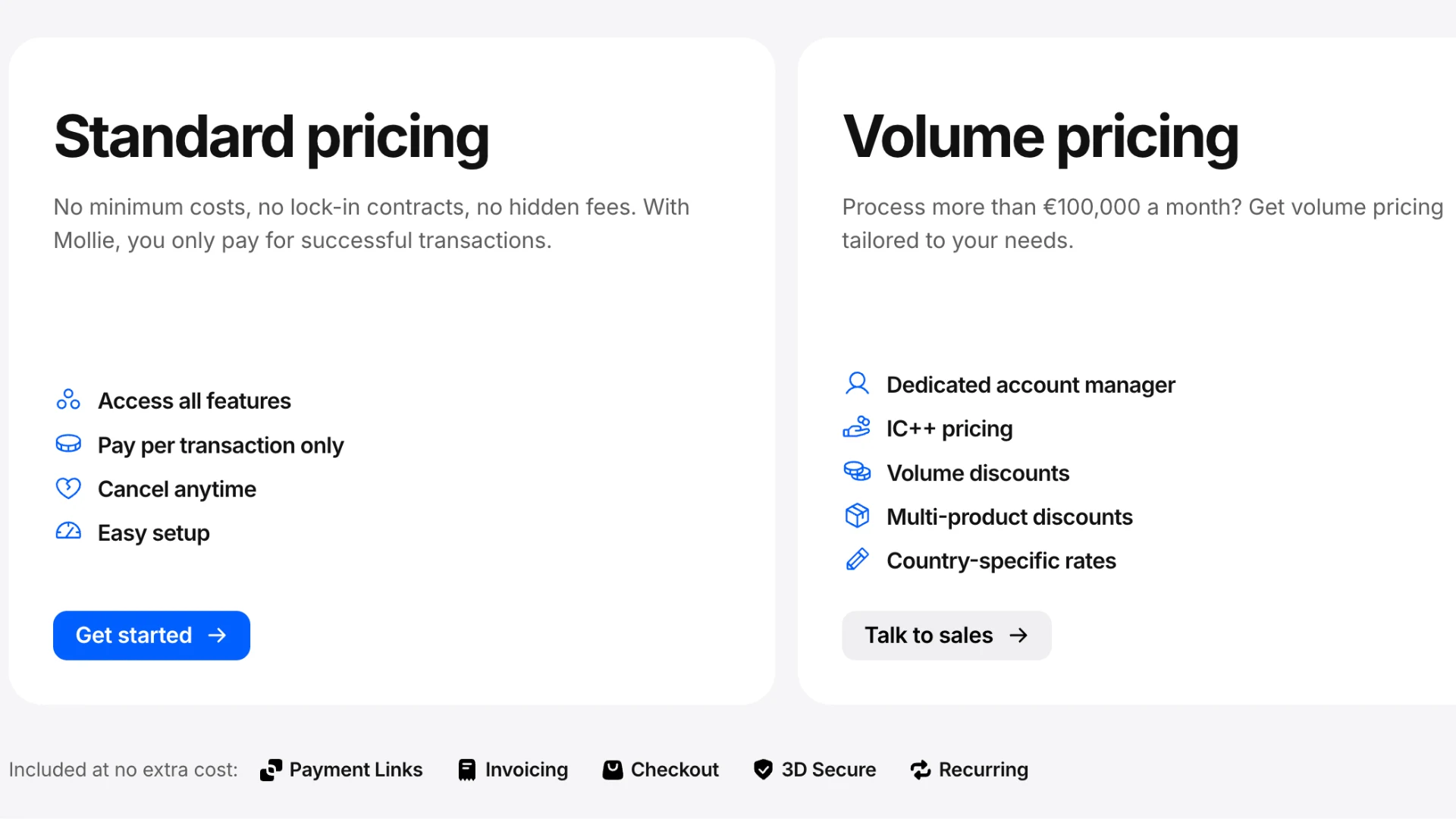
- Mobile and fixed terminal
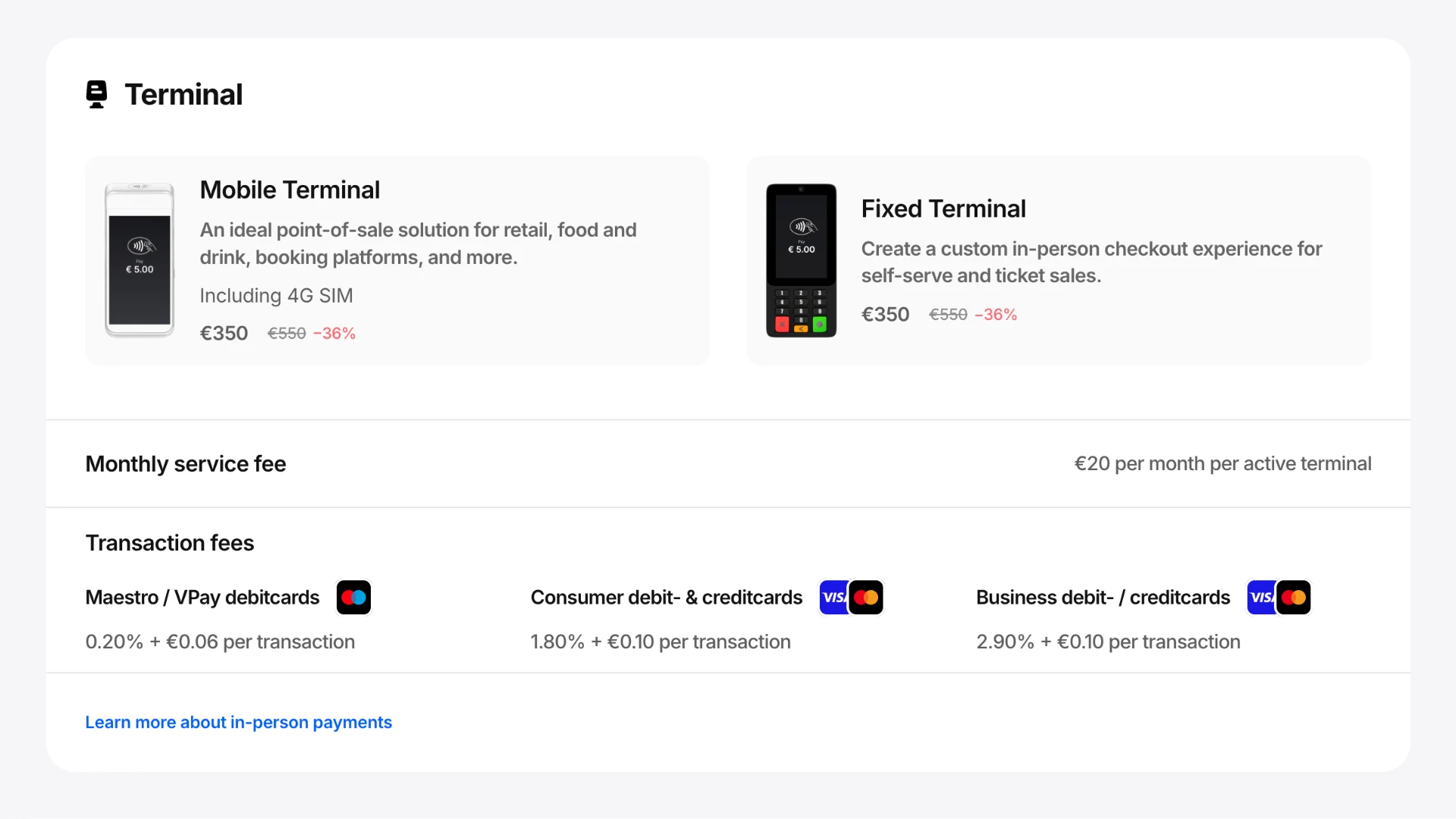
- Transaction fees per payment method
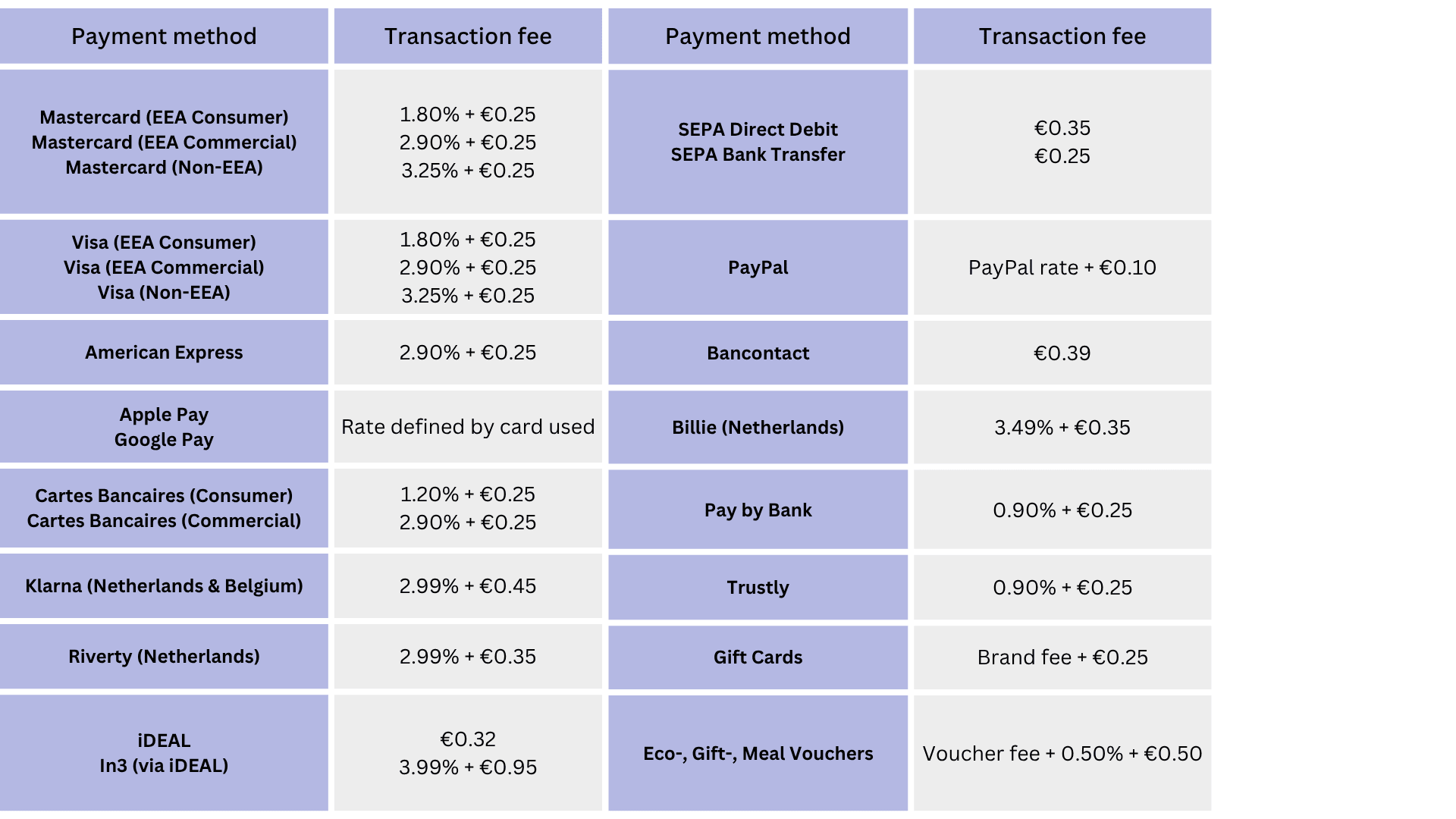
Who should use Mollie?
Mollie is a fantastic option for small to mid-sized businesses, especially those focused on European markets. If you’re a local business or startup and want to start accepting payments quickly without developer resources, Mollie is incredibly user-friendly. It’s also perfect for charities, subscription boxes, or creatives selling services across the EU.
Stripe vs Adyen vs Mollie: comparison overview
Choosing between these providers depends on your business model, location, size, and technical capacity. Here’s a quick comparison of key factors:
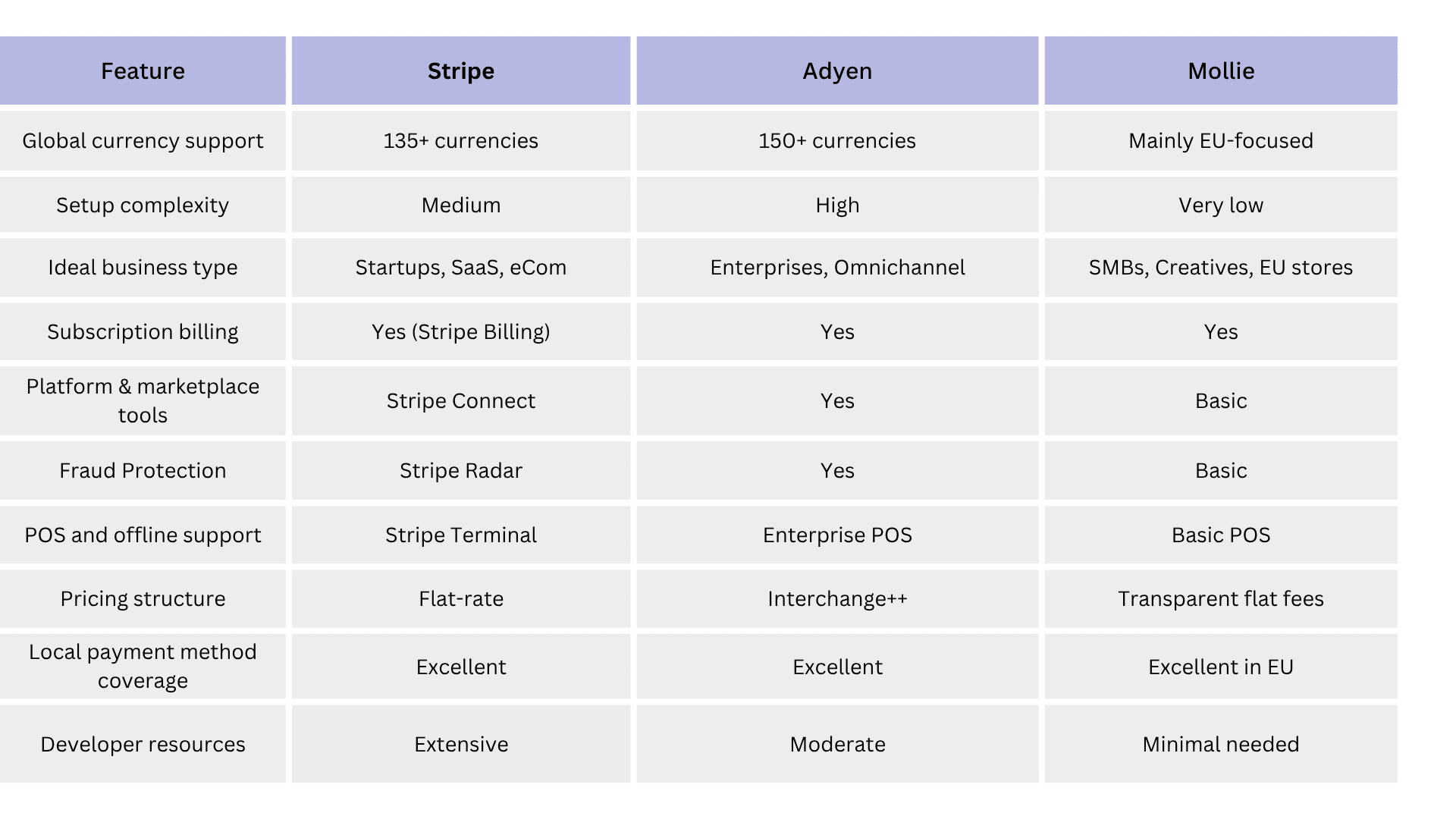
Real-world use cases
If you're a startup selling digital products worldwide, Stripe will give you the global tools and flexible infrastructure you need. Running a large omnichannel retail chain? Adyen is better suited for your complex needs, with high-volume optimization and integrated POS. Launching an eCommerce store in Germany or the Netherlands? Mollie supports all local payment methods and gets you started quickly.
Final thoughts: which PSP should you choose in 2025?
There’s no single best PSP—only the one that best fits your business needs. Stripe, Adyen, and Mollie each offer unique benefits:
- Choose Stripe if you're scaling fast, selling globally, or need a customizable developer-first platform.
- Choose Adyen if you're a large, established business with international reach and complex payment needs.
- Choose Mollie if you're a smaller or mid-sized business based in Europe that wants fast, easy, and transparent payment processing.
As online shopping continues to evolve, having the right PSP behind your checkout page can make all the difference. Your payment partner isn’t just a processor—it’s a part of your customer experience, your operations, and your growth strategy. Still not sure which PSP is best? Start by reviewing your customer base, growth goals, and technical resources. From there, testing one or two solutions in parallel may help you find the best fit. And if you're looking to further protect your payments ecosystem, tools like Chargeflow can help you automate chargeback recovery and prevent friendly fraud—essential for 2025’s risk landscape. With the right payment partner in place, you can worry less about transactions and focus more on growing your business.
Need help choosing or integrating the right payment platform?
At Codelevate, we help startups build smarter, scalable digital solutions—whether you're launching your first online store, scaling your SaaS, or adding AI to your workflow. Book a free strategy call with our team and let’s elevate together!


.webp)


.svg)




